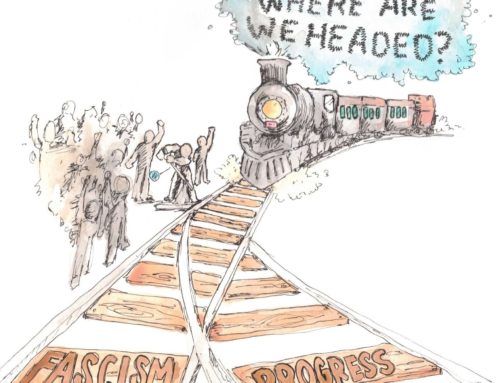By Stephanie McMillan
The historical development of capitalism drives inexorably (though not uniformly) toward the concentration of capital. This is expedited by increasing the scale of production, dominating markets, and improving technology. Concentrations of capital form monopolies that can exert proportional power (control) over the economic and political arrangements of the social formations they dominate.
When capital, ruled by its growth imperative, inevitably reaches limits to the accumulation of surplus value within the territory (nation, or social formation) it already controls, it must expand beyond its borders to conquer other areas. It uses the state(s) of its home base(s) to wage politics (up to and including war, the most extreme form of politics) on other social formations—to subjugate the ones it can, as well as to compete with others over how to carve up the world.
Though empires have existed before capitalism, imperialism is a specific stage of capitalism. Colonialism developed into imperialism with the internationalization of monopoly capital. More than simply an aggregate of national economies, imperialism is an integrated world system that is linked to a qualitatively increased socialization of production, and the complete partition and control of the world by the capitalist class.
There is an interplay of contradictions between the national and international aspects of capital, as well as between different forms of capital, between capitalist blocs, and between their individual and collective interests (the latter represented by states). So the reality is much more complex, but in a very general sense the imperialist era is characterized by two types of social formations: those where capital is accumulated (the core), and those from which surplus value (profit) is extracted (the periphery). The ruling capitalist class rooted in imperialist social formations dominates other entire social formations economically, politically and ideologically, while it also dominates the popular classes (particularly the working class) inside its own social formations.
The forms of imperialism have developed over time, its nature in different periods determined by the history of human society. During the capitalist era, three distinct periods of imperialism can be defined, corresponding to the dominance of different forms of capital. Each of these has superseded—but not replaced—the previous forms, which still persist. They are: mercantile capital, industrial capital, and finance capital. The policies of imperialist countries in their relations with dominated countries are determined by the form of capita that is hegemonic at the time.
1) Mercantile capital
This form of capital extracts surplus value through trade. An “unequal trade” is achieved by the overvaluation of goods originating from the dominant nation and the undervaluation of goods from the dominated nation(s). It demands a positive balance of trade in favor of the imperialist country (more finished goods are exported than imported, and more money—initially primarily in the form of gold and silver—is imported than exported). Its main activities are primary accumulation (seizing raw materials) and opening markets (forcibly when necessary).
International trade expanded in Western Europe from the 16th to late 18th century, facilitated by urbanization, advancements in shipping, and centralized nation-states replacing small feudal kingdoms. States and merchants mutually strengthened each other—states assisted merchants by imposing tariffs, and were in turn strengthened by the funds they received. A network of colonies was seized and controlled through military force and threat of force.
Colonies were social formations directly administered by the dominant nations. Today, though colonies have been transformed into neo-colonies (with facades of independent governance), this form of capital still employs overt violence or threats to back up policies that ensure trade advantages, such as subsidies, tariffs and quotas, and specialization of industry.
2) Industrial capital
As industrial capitalism arose (in conflict with feudalism) it expanded, ultimately saturating the investment opportunities in its “home base” areas and straining against the limits of its national boundaries. The export of capital itself became more urgent than the export of goods. Production was moved to wherever variable costs (particularly labor) were cheapest.
In its later stage, states assisted the process by breaking down the last barriers to globalizing production, brokering “free trade” agreements (like NAFTA) that promised to level the international field of competition. In reality, this arrangement (neo-liberalism) favored the monopoly capital blocs backed by imperialist states, and facilitated a new round of surplus value extraction from dominated social formations.
Dominated nations were strong-armed into the global economy. Though promised initially as a path for their productive forces to be “developed” and strengthened, instead their local economies were further undermined and deformed. This created dependency and drove them to compete with one another for foreign investment just to survive. In order to attract capital, they were compelled to drive down wages, weaken environmental standards, and increase domestic repression to provide a more “investor-friendly environment.” Free trade in the framework of capitalism was in reality a scheme to accumulate more profit on the backs of the local populations, whose misery only increased.
The destruction of dominated national economies also forced their states to accept “assistance” in the form of loans. These were offered with the imposed conditions of “structural adjustment”—the privatization of public institutions (which international capital could then feast upon), plus cuts in social services in favor of payments of interest on loans.
As global industrialization also reaches its inevitable limits, capital begins to choke. It is forced to open new avenues of expansion—privatizing and commodifying every aspect of life from largest (asteroids and the moon) to smallest (DNA), from the material (water) to the immaterial (emotions). It must be invested, no matter what the cost. Capital will cannibalize its “home base”—the land (primary accumulation in the US takes forms like mountaintop removal and fracking), and the population (following the privatization of prisons, the US, with 5% of the world’s population, now has 25% of its prisoners). It will bring structural adjustment (plus concurrent repression) home. Abroad, it will bomb innocent populations for years on end just to keep its war machine chewing up excess capital. It won’t hesitate even in the face of disastrous world-scale consequences like radiation and climate change. It will destroy everything, including itself, if it is not stopped.
3) Finance capital
As new opportunities to invest profitably in industry have become more difficult to locate, capitalists pushed for financial regulations to be removed, so they could direct their restless capital at least somewhere. Profits are now increasingly based not on material production of real value, but on fictitious (toxic) values gained through credit, speculation and arbitrage.
Organizations that are set up to facilitate imperialist interests (USAID, World Bank, IMF) have shifted from making loans for industrial development, toward making loans to collect interest and for speculation. (Land is the new hot commodity—5% of all agricultural land in Africa has been sold or leased to foreign investors in recent years, much of it financed by the World Bank). Debt has been pushed onto every level of society, from individuals, to businesses of all sizes, to governments (including those of imperialist nations themselves). Debt has surpassed invasion in many instances as a tool of domination. The entire world is enslaved to paying interest on the imaginary fruits of future labor that will never ripen.
The trade of commodities, stocks, bonds, securities, futures, etc. has become internationalized. The high volatility of these speculative markets is causing great global economic instability—
financial bubbles that collapse and cause even more misery for the people. It also causes intensifying conflicts between the various factions of the capitalist class over which awful actions they will decide to take to push forward through their deepening structural crisis (expanding multiple wars? ecological collapse? genocide? all of the above?) in their vain hope to restructure on a cleared off and desolate field.
It also causes the dominated classes—at the limits of endurance—to seek a way out of this hell created by the system. Resistance bubbles up in every corner of society, organizations begin to cohere, and an international movement capable of throwing off capitalism and imperialism struggles to come into being.
Those of us living inside the U.S.—the most violent and destructive imperialist power in the world—must take a stand against all forms of imperialist aggression, and build organizations that support and work in solidarity with liberation movements internationally. We must increase our own power to fight against the capitalist system that dominates the entire world for the benefit of a few.






[…] Imperialism is the natural expansion of capitalism. When capital, ruled by its growth imperative, inevitably reaches limits to the accumulation of surplus value within a territory (nation, or social formation) it already controls, it must expand beyond its borders to conquer other areas. It uses the state(s) of its home base(s) to wage politics (up to and including war, the most extreme form of politics) on other social formations—to subjugate the ones it can, as well as to compete with others over how to carve up the world. […]
[…] Imperialism is the natural expansion of capitalism. The constant need for growth and increased profits sends capitalists beyond national boundaries in search of new markets and lower production costs. […]
[…] Imperialism is the natural expansion of capitalism. The constant need for growth and increased profits sends capitalists beyond national boundaries in search of new markets and lower production costs (read unregulated exploitation of labor and environment). […]
[…] ever-increasing profits, which demands lower production costs, ie lower wages and exploitation. Imperialism is the natural expansion of capitalism. That constant need for growth and increased profits sends […]